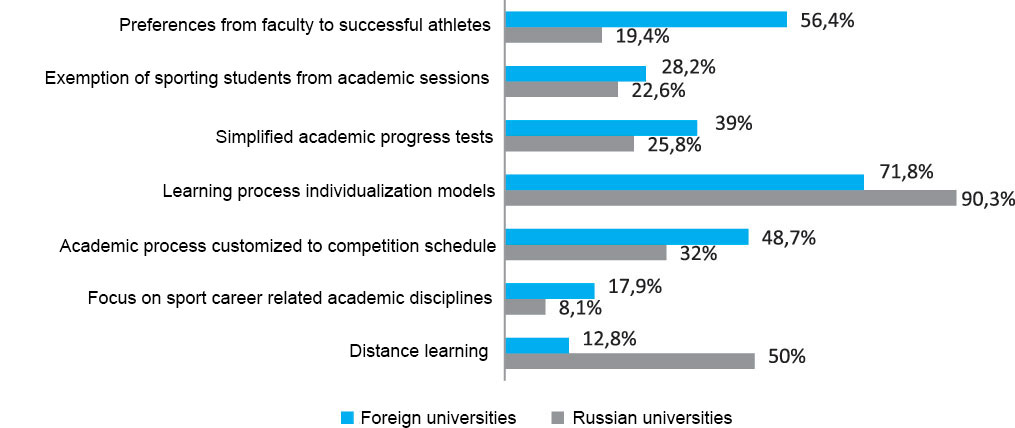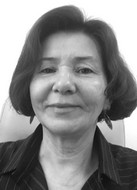Academic educational process integration with sports training at physical education universities
Фотографии:
ˑ:
Dr.Hab., Professor F.R. Zotova1
PhD, Associate Professor S.V. Sadykova1
V.M. Gaznanova1
PhD F.A. Mavliev1
A.Z. Manina2
1Volga Region State Academy of Physical Culture, Sport and Tourism, Kazan
2Institute of Kazan (Volga Region) Federal University, Yelabuga
Keywords: integration, educational process, athletic training, Russian academic athletes, foreign student athletes.
Background. The problem of a few academic education curricula being combined with an athletic career (the so-called ‘double career’) by sporting students is being widely discussed by the national and foreign analysts. As found, for instance, by the study reports by M. Amara, 2004; L. Corrado, 2012; R. Caput-Jogunica, 2012 et al., the academic learning process may be successfully combined with an athletic career when the curriculum is reasonably customizable and students are well motivated on a systemic basis. Universities in Austria, Ireland, Slovenia, Poland and Portugal have been successful in motivating their sporting students by the sport scholarship systems [3, 4].
Objective of the study was to analyze the existing practice of the academic educational process in a higher educational institution being combined with athletic careers.
Methods and structure of the study. The study included a university faculty and management (n=101) questionnaire survey run at Russian and foreign physical education universities. 62 people from 5 Russian physical education universities and 39 people from universities of Bulgaria, Uzbekistan, Latvia and Armenia were subject to studies. The survey found, among other things, that 9% of students in Russian physical education universities are members or prospects for national teams. As reported by the foreign sample, their university student population includes 20.9% of the national team members and 30.6% of prospects for the national teams.
As reported by the Russian university faculty and management, the biggest problem with academic training of elite athletes is their tense competitive schedules that make it difficult for them to study more often than twice a year, as they spend much time in training camps getting ready for competitions.
Study findings and discussion. As was found in the elite student-athletes’ questionnaire survey, they give a higher priority to competitive accomplishments than to academic progress and high-quality education [1]; and, hence, universities have to compete with sport clubs and coaching teams trying to motivate their students for education. As reported by the Russian sample, when the coaches or clubs are reluctant to effectively cooperate with universities in the academic process customizing issues, this may be a serious barrier for the academic progress of the students who are more focused on their athletic careers. This means that no attempt to effectively customize the academic educational process to the sporting needs of an elite athlete may be successful enough unless supported by due cooperation of the sport club management, sport agent, coaching team etc. with the university.
The Russian university faculty and management are also concerned about the poor school knowledgebase of the sporting students; as they tend to mention it as one more reason (in addition to intense training and competitive schedules) for their poor academic progress. It should be noted that ranked on top by the foreign sample is the problem of the poor school knowledgebase of the sporting students; plus they are also very concerned about the low academic progress motivations in this student group.
Furthermore, the university faculty and management make an emphasis on the ‘consumptive attitudes’ of the elite sporting students to the academic process and progress – that means that most of the elite athletes expect preferences in exams and tests and are not always prepared to work hard for the academic success.
The academic process customization models and tools applicable to the sporting students are of special interest for the purposes of the study. Given in Figure 1 hereunder are the questioning survey data on this issue.

Figure 1. Responses to the question “What academic process customization models and tools are offered by your university to sporting students?”
The sporting students’ questionnaire survey showed about one student out of four feeling alien to the university student community – that may be due to the leading student-athletes having no time to socialize in the student communities. The relatively short time of the academic trainings in between the training and competitive periods is normally claimed by the tests, debt coverage and exams rather than social activity. As seen from the monitoring of the academic behaviour of such sporting students, they are not eager to make friends in the student community as their communication is limited by their teammates and sport clubs and they normally state that the ‘life of their peers is rather special and alien for me, I have my own life” [2]. That is why special attention shall be given to the sporting students’ socializing efforts and models to help them reasonably integrate into academic communities.
In Russian universities attempts are made to socialize the sporting students in the academic communities by their sporting image promotion initiatives including meetings with peer students after their competitive accomplishments; mass media (radio, TV, websites, and university printed publications) coverage of their sport success stories; and other efforts to promote them as the leading athletes defending the colors of the university, region and/or country and working hard for success.
The foreign sample tends to rely on special curators for the sporting students’ socializing initiatives, with the curators expected to help them cooperate with the faculties on the one hand and with student peers on the other hand, so as to encourage their productive contributions to the university social activities, mass cultural, intellectual and research projects and events.
The questionnaire survey data and analyses showed the Russian physical education universities often making resort to lump-sum bonuses and scholarships categorized for the competitive accomplishments (as reported by more than a half of the national sample). The rest of the national sample reports their universities giving preference to the non-financial motivation systems.
The foreign sample reported a different model that implies the competitive accomplishments of the student-athletes being widely publicized via university websites and local mass media organizations, with photos of sport celebrities posted in classrooms to motivate the communities and the athletes. This response was given by 71.8% of the foreign sample; whilst 35.9% reported their universities motivating the sporting athletes by the lump-sum bonuses for their competitive accomplishments.
Furthermore, the possibility of academic education being successfully combined with an athletic career were tested by a questionnaire survey, and the findings were as follows:
– According to more than a half of the total sample the academic education can be successfully combined with an athletic career – provided the educational process is duly customized and managed;
– About 40% and 30% of the Russian and foreign sample, respectively, believe that the academic education may be successfully combined with an athletic career, conditional on the right mindset and determination of the athlete and his/her sport club/ coach;
– Only 3.2% and 15.4% of the Russian and foreign sample, respectively, believe that the academic education may not be successfully combined with an athletic career, since the global competition is so tense that a combination of both is unrealistic.
For the academic education to be successfully combined with an athletic career, the sample offers the following ideas:
– Make due regulatory provisions to facilitate the educational process (compliant with the state educational standards) being effectively combined with an athletic career;
– List universities with institutions formally authorized for sport training service, with this option supported by 40.3% and 38.5% of the Russian and foreign sample, respectively; and
– Some respondents believe that due legal provisions shall be put in place so the sporting students could qualify for the academic educational period being extended.
Conclusion. Most of the respondents believe that the academic educational process integration with an athletic career may be highly beneficial conditional on the academic educational process design and management being efficient and the athletes and coaches being highly determined. It should be noted, however, that about 10% of the respondents are skeptical saying the successful integration is unlikely.
References
- Afanasyeva V.M., Zotova F.R. Sportivnaya kariera ili vysshee obrazovanie? K voprosu ob integratsii obrazovatelnogo protsessa i sportivnoy podgotovki [Athletic career or higher education? On integration of educational process with athletic training]. Nauka i sport: sovremennye tendentsii, 2014, vol. 4, no. 3, pp. 115-119.
- Zotova F.R., Afanayseva V.M., Davletova N.Kh. et al. Otnoshenie studentov-sportsmenov k integratsii obrazovatelnogo protsessa i sportivnoy podgotovki [Attitude of student-athletes to integration of educational process with athletic training]. Uchenye zapiski un-ta im. P.F. Lesgafta, 2015, no. 10 (128), pp. 73-79.
- Corrado L., Tessitore A., Capranica L., Rauter S., Topic V.D. Motivation for a dual – career : Italian and Slovenian student-athletes. Kinesiologia Slovenica, 2012, no. 18 (3), pp. 47-56.
- Gelder I. Center of elite sport and education in the Netherlands: International University Sports Federation Conference. University and Olympic sport: two models – one goal? 2013. July 14-17.
Corresponding author: zfr-nauka@mail.ru
Abstract
The study analyzes the existing practice of the academic educational process being combined with athletic career at physical education universities. The relevant practical experiences were tested by a faculty questionnaire survey at Russian and foreign physical education universities. The study found significant intergroup differences in the academic educational process integration with athletic careers and analyzed the most promising integrative solutions.
Most of the respondents believe that the academic educational process integration with an athletic career may be highly beneficial conditional on the academic educational process design and management being efficient and the athletes and coaches being highly determined. It should be noted, however, that about 10% of the respondents are skeptical saying that the successful integration is unlikely.




 Журнал "THEORY AND PRACTICE
Журнал "THEORY AND PRACTICE